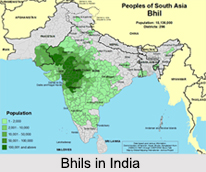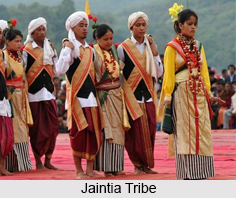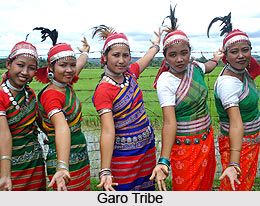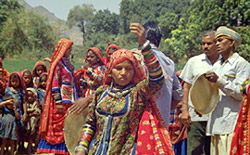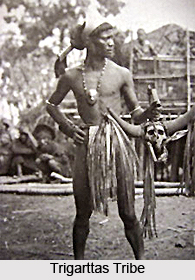 The Trigarttas, like the Yaudheyas, were a Kshatriya tribal republic depending mainly on arms. This close association of Trigarttas and Yaudheyas indicate the fact that their territories were contiguous. The earliest mention of the Trigarttas has been made in the Astadhyayi of Panini. Instead of direct references there have been several indirect references of the tribe in many of the Sutras. In the Mahabharata, also Trigarttas and Yaudheyas are often associated, both having rallied on the side of Duryodhana. The Trigarttas along with the Salvas, Ambasthas, and other tribes were included in the army of Bhishma.
The Trigarttas, like the Yaudheyas, were a Kshatriya tribal republic depending mainly on arms. This close association of Trigarttas and Yaudheyas indicate the fact that their territories were contiguous. The earliest mention of the Trigarttas has been made in the Astadhyayi of Panini. Instead of direct references there have been several indirect references of the tribe in many of the Sutras. In the Mahabharata, also Trigarttas and Yaudheyas are often associated, both having rallied on the side of Duryodhana. The Trigarttas along with the Salvas, Ambasthas, and other tribes were included in the army of Bhishma.
History says that in the battle of Kurukshetra the Trigarttas seem to have had a hard fight with Nakula, the fourth Pandava, while on another occasion their King Susarma fought a stiff battle with Arjuna. As a result of the war, the Trigarttas along with the Kasmiras, Malavas, Sivis, Yaudheyas, Ambastn`as, and other tribes were totally defeated, and they all paid homage to Yudhisthir. The Trigarttas in the Mahabharata have been described as a tribe of Punjab. Hemchandra has said that Trigartta and Jalandhar are synonymous but from various references it can well be understood that the tribe Trigarttas inhabited a region not far from Kashmir.
In the Puranas, the Trigarttas are reckoned among the mountain tribes. Some historians have identified the Trigartta country with Kangra, which is situated in Jalandhar between the mountains of Chamba and the upper course of the Beas River. The word `Trigartta` is interpreted to be the land watered by the three rivers,-the Ravi, the Beas, and the Sutlej. It is also explained as the country of the three strongholds, and is identified by some scholars with the modern hill-state of Kotoch, which is still called `Trigartaka Mulk`, or the region of the Trigarttas.
As per as the political history of the Trigartta tribe is concerned it can be said that that from about 700 to 1150 A.D., the country was practically a dependency of one or other of the Kashmir dynasties. The Trigartta country is said to have acknowledged the supremacy of the King of Kashmir during the reign of Ananta of the line of Abhinava.


















